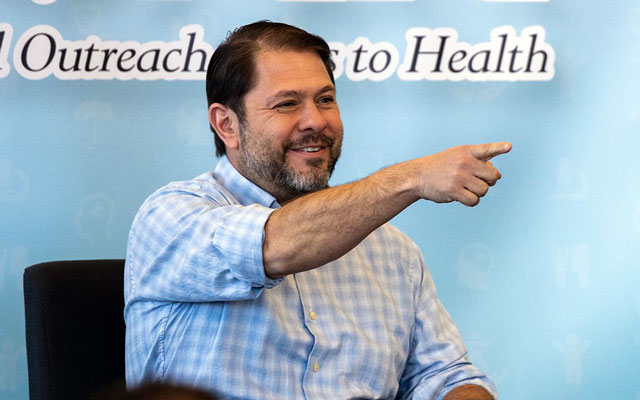By Emma Bradford/Cronkite News
WASHINGTON – Sen. Ruben Gallego will devote part of his first August recess as a senator to visiting with voters in Iowa – a sign the Arizona Democrat may be eyeing a presidential run.
The odds would be against him. Just two first-term senators have made the leap to the White House. And historically, Arizona presidential candidates haven’t fared well, either.
Gallego is scheduled to appear at the Iowa State Fair on Aug. 8, a traditional stop for presidential hopefuls – those who have formally joined the race and those still testing the waters.
The next day, he will headline a town hall in Davenport, co-hosted by the Iowa Democratic Party and the Democratic Congressional Campaign Committee, the party’s House campaign arm.
The senator will focus attention on a pair of Iowa Republicans targeted by Democrats in next year’s midterm elections – Sen. Joni Ernst and Rep. Mariannette Miller-Meeks – and their support for the huge tax cut and spending cut megabill that President Donald Trump signed on July 4.
Democrats see both as vulnerable. Miller-Meeks eked out a reelection win last November by just 800 votes. In late May, Ernst brushed off a constituent’s anxiety about impending Medicaid cuts by saying, “Well, we all are going to die.”
Gallego will use the town hall to speak “directly to voters about the impact the law will have on Iowa families and how leaders like Joni Ernst and Mariannette Miller-Meeks turned their back on Iowans to give billionaires yet another tax cut,” according to his announcement of the event.
Iowa has long been a critical testing ground for presidential candidates, hosting the first contest every four years.
That changed after the 2020 caucuses, when it took the state party more than two weeks to deliver final results. The state chairman resigned, and the national party stripped Iowa of its first-in-the-nation status.
Numerous states coveted Iowa’s spot at the start of the presidential nomination calendar. The 2020 fiasco gave critics fresh ammunition. The state’s overwhelmingly white electorate has long been a concern for many Democrats, as well.
“They … don’t see Iowa as being representative of the nation,” said Karen Kedrowski, a professor of political science and director of the Carrie Chapman Catt Center for Women and Politics at Iowa State University. “Though I would argue that Iowa is more representative of the nation than people give it credit for.”
Of the 47 presidents, 17 had served in the Senate, and nine of those got to the White House with one term or less under their belt.
The only two presidents who came directly from the Senate were Warren G. Harding, an Ohio Republican, and Barack Obama, an Illinois Democrat.
Gallego hasn’t said whether he intends to run, but readily acknowledged that “of course” he’s thought about it, telling NBC News in May, “I’m an elected official. It crosses my mind.”
Since 1972, a dozen first-term senators have run for president, including Kamala Harris, who became vice president, and current Secretary of State Marco Rubio.
Only one nabbed the nomination: Obama. And unlike Gallego, he had drawn national attention with a spellbinding speech at the 2004 presidential convention, while he was still a state senator.
Gallego got a turn on the convention stage last summer in Chicago as a House member running for the Senate. He was well-received by delegates but did not emerge as a star as Obama had.
“I don’t think Gallego is quite in the same boat,” said Tim Hagle, a political scientist at the University of Iowa, adding that Obama “made a really big splash at the Democratic Convention and got the big buzz going.”
Two Arizona senators have won the Republican presidential nomination. Both lost in the general election – Barry Goldwater, who lost to incumbent Lyndon Johnson in 1964, and John McCain, who lost to Obama in 2008.
Two Arizona Democrats were serious contenders but fell short in the primaries: Rep. Morris Udall in 1976 and former Gov. Bruce Babbitt in 1988.
“When you come to Congress, if you’re under 65 and not under indictment, you’re presumed to be a presidential candidate,” Udall joked in the years after losing to Jimmy Carter in the primaries.
Between him and Goldwater, Udall quipped, “we’ve made Arizona the only state where mothers don’t tell their children they can grow up to be president.”
Gallego is part of a growing field of potential 2028 contenders.
Many of his possible rivals have already made forays into Iowa and other states that could be critical.
And many have much higher profiles than Gallego, a former Marine who served for a decade in the House representing a Phoenix-based district. Among them: Govs. Gavin Newsom of California, J.B. Pritzker of Illinois, and Andy Beshear of Kentucky; former Transportation Secretary Pete Buttigieg; and more senior Senate colleagues such as Cory Booker of New Jersey.
Many party activists would prefer someone more progressive, such as Rep. Alexandria Ocasio-Cortez, D-N.Y., Hagle said, adding, “Right now, the Democrats are leaning more towards the much more progressive side of things, rather than what used to be mainstream Democrats.”
Gallego has emphasized border security since joining the Senate, distancing himself from the party’s left flank, but has also been an outspoken critic of Trump on a range of topics.
Speculation about his 2028 prospects began just after Election Day in November, even before his victory over former TV anchor Kari Lake became certain.
One risk for senators eyeing the White House is that constituents back home could feel neglected as they travel the country drumming up support. Kedrowski said Gallego has little to worry about, though, because he won’t face Arizona voters again until 2030.
“Voters have very, very short memories,” she said.










